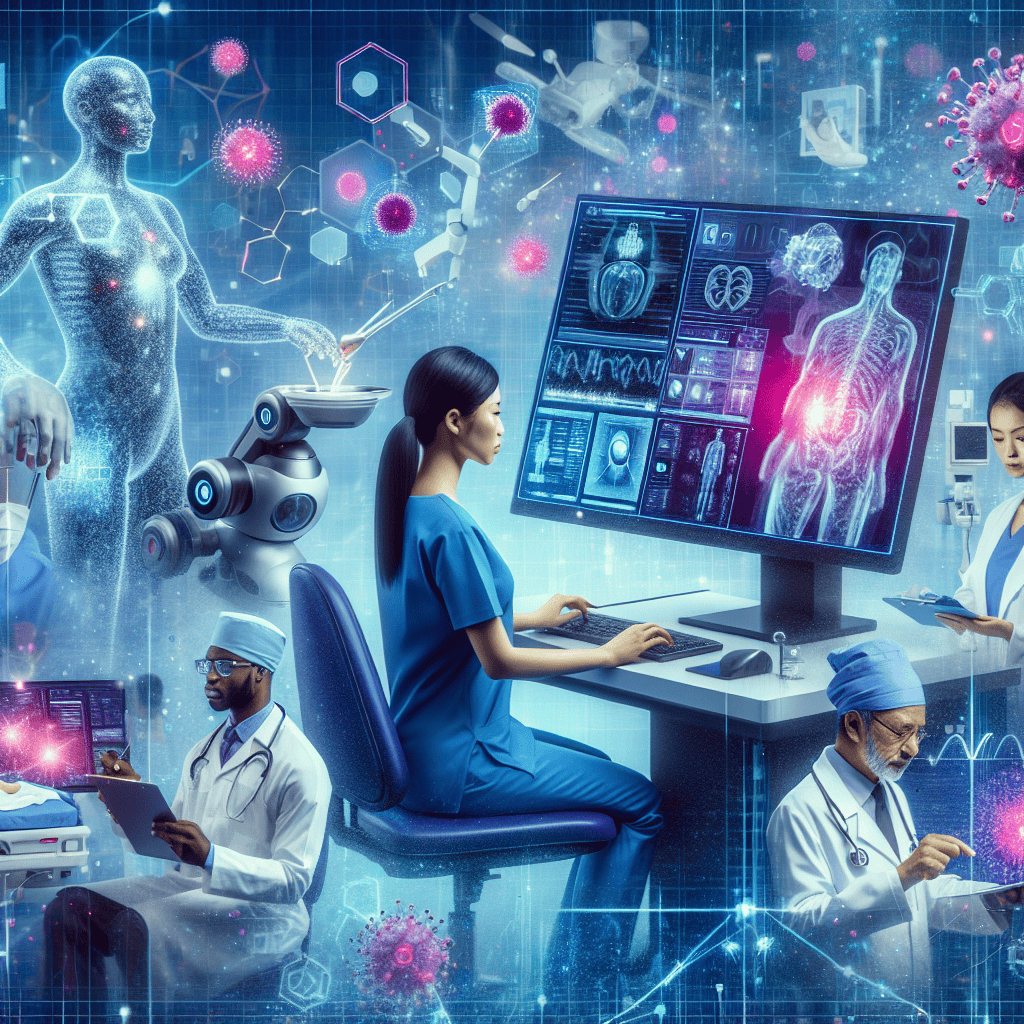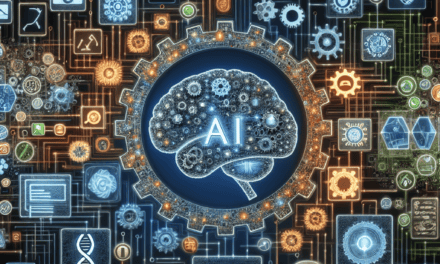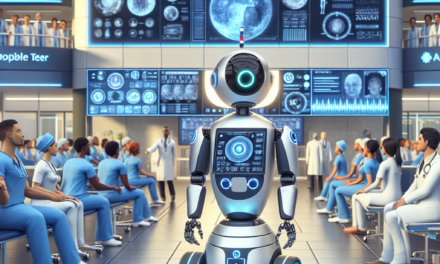Transforming Healthcare: The Role of AI in the Future

The integration of Artificial Intelligence (AI) into healthcare is not just a futuristic concept but a present-day reality that is reshaping the landscape of medical practice and patient care. As AI technologies continue to evolve, they offer unprecedented opportunities to enhance the efficiency, accuracy, and accessibility of healthcare services. This article delves into the transformative role of AI in healthcare, exploring its potential to revolutionize various aspects of the industry. We will examine five key subtopics, each providing a comprehensive analysis of AI’s impact on healthcare.
1. AI in Diagnostics: Revolutionizing Disease Detection
One of the most promising applications of AI in healthcare is in the field of diagnostics. AI algorithms, particularly those based on machine learning and deep learning, have demonstrated remarkable capabilities in analyzing medical data to detect diseases with high accuracy. This section explores how AI is transforming diagnostics and the implications for early disease detection and treatment.
1.1 Enhancing Diagnostic Accuracy
AI systems are designed to process vast amounts of data quickly and accurately, making them ideal for diagnostic purposes. Machine learning algorithms can analyze medical images, such as X-rays, MRIs, and CT scans, to identify patterns and anomalies that may indicate the presence of disease. For instance, AI has been used to detect early signs of cancer, such as breast cancer and lung cancer, with accuracy rates comparable to or even exceeding those of human radiologists.
In a study published in the journal “Nature,” researchers developed an AI model that outperformed radiologists in detecting breast cancer from mammograms. The AI system reduced false positives and false negatives, leading to more accurate diagnoses and potentially saving lives through earlier intervention.
1.2 Speeding Up Diagnosis
AI can significantly reduce the time required for diagnosis, allowing for quicker treatment decisions. Traditional diagnostic processes can be time-consuming, often involving multiple tests and consultations. AI-powered tools can streamline this process by providing rapid analysis and results. For example, AI algorithms can analyze medical images in seconds, enabling healthcare providers to make faster and more informed decisions.
In emergency situations, such as stroke or heart attack, time is of the essence. AI can assist in quickly identifying the condition and suggesting appropriate interventions, improving patient outcomes and reducing the risk of complications.
1.3 Personalized Diagnostics
AI has the potential to personalize diagnostics by considering individual patient data, such as genetic information, lifestyle factors, and medical history. This personalized approach can lead to more accurate diagnoses and tailored treatment plans. For instance, AI can analyze a patient’s genetic profile to identify specific mutations associated with certain diseases, enabling targeted therapies that are more effective and have fewer side effects.
Moreover, AI can continuously learn from new data, adapting its diagnostic capabilities to reflect the latest medical research and trends. This adaptability ensures that AI systems remain at the forefront of medical advancements, providing patients with the most up-to-date and accurate diagnoses.
1.4 Overcoming Diagnostic Challenges
AI can help overcome some of the challenges associated with traditional diagnostics, such as variability in human interpretation and limited access to specialized expertise. In regions with a shortage of healthcare professionals, AI can provide valuable support by offering diagnostic insights that may otherwise be unavailable. This democratization of healthcare can improve access to quality care for underserved populations.
Furthermore, AI can assist in diagnosing rare diseases that may be difficult for human clinicians to identify due to their limited exposure. By analyzing large datasets and recognizing subtle patterns, AI can suggest potential diagnoses that may not have been considered otherwise.
1.5 Ethical Considerations in AI Diagnostics
While AI offers significant benefits in diagnostics, it also raises ethical considerations that must be addressed. Issues such as data privacy, algorithmic bias, and the potential for over-reliance on AI systems are important factors to consider. Ensuring that AI systems are transparent, accountable, and used as a complement to human expertise is crucial for maintaining trust in AI-driven diagnostics.
Healthcare providers must also ensure that AI systems are trained on diverse datasets to minimize bias and provide accurate diagnoses for all patient populations. Ongoing monitoring and evaluation of AI systems are essential to ensure their continued effectiveness and ethical use in healthcare.
2. AI in Treatment: Enhancing Precision and Personalization
AI is not only transforming diagnostics but also revolutionizing treatment approaches in healthcare. By leveraging AI technologies, healthcare providers can enhance the precision and personalization of treatments, leading to improved patient outcomes. This section explores how AI is being used to optimize treatment strategies and the potential benefits for patients.
2.1 Precision Medicine
Precision medicine is an approach that tailors medical treatment to the individual characteristics of each patient. AI plays a crucial role in enabling precision medicine by analyzing vast amounts of data to identify the most effective treatment options for specific patients. This data-driven approach considers factors such as genetic information, lifestyle, and environmental influences to develop personalized treatment plans.
For example, AI can analyze a patient’s genetic profile to identify specific mutations that may influence their response to certain medications. This information can guide healthcare providers in selecting the most appropriate drugs and dosages, reducing the risk of adverse reactions and improving treatment efficacy.
2.2 Drug Discovery and Development
AI is also transforming the process of drug discovery and development, making it faster and more cost-effective. Traditional drug development is a lengthy and expensive process, often taking years and billions of dollars to bring a new drug to market. AI can streamline this process by analyzing large datasets to identify potential drug candidates and predict their effectiveness.
Machine learning algorithms can analyze chemical structures and biological data to identify promising compounds that may have therapeutic potential. This approach can significantly reduce the time and cost associated with drug discovery, accelerating the development of new treatments for various diseases.
2.3 Optimizing Treatment Plans
AI can assist healthcare providers in optimizing treatment plans by analyzing patient data and suggesting evidence-based interventions. For instance, AI algorithms can analyze electronic health records (EHRs) to identify patterns and trends that may indicate the most effective treatment strategies for specific conditions.
In oncology, AI can analyze data from clinical trials and real-world patient outcomes to recommend personalized treatment plans for cancer patients. This approach ensures that patients receive the most effective therapies based on their unique characteristics, improving survival rates and quality of life.
2.4 Monitoring and Adjusting Treatments
AI can also play a role in monitoring and adjusting treatments in real-time. Wearable devices and remote monitoring technologies can collect continuous data on a patient’s health status, allowing AI algorithms to detect changes and suggest adjustments to treatment plans as needed.
For example, AI-powered insulin pumps can continuously monitor blood glucose levels in diabetic patients and automatically adjust insulin delivery to maintain optimal levels. This real-time monitoring and adjustment can improve disease management and reduce the risk of complications.
2.5 Ethical Considerations in AI-Driven Treatments
As with AI diagnostics, the use of AI in treatment raises ethical considerations that must be addressed. Ensuring patient privacy and data security is paramount, as AI systems rely on large amounts of personal health data. Additionally, healthcare providers must ensure that AI-driven treatment recommendations are evidence-based and do not replace human judgment.
Transparency and accountability are also important considerations, as patients and healthcare providers must understand how AI systems arrive at treatment recommendations. Ongoing evaluation and validation of AI algorithms are essential to ensure their continued effectiveness and ethical use in healthcare.
3. AI in Patient Care: Improving Accessibility and Efficiency
AI is playing a pivotal role in enhancing patient care by improving accessibility and efficiency in healthcare delivery. From virtual assistants to telemedicine platforms, AI technologies are making healthcare more accessible and convenient for patients. This section explores how AI is transforming patient care and the potential benefits for healthcare systems and patients alike.
3.1 Virtual Health Assistants
AI-powered virtual health assistants are becoming increasingly popular as a means of providing patients with convenient access to healthcare information and support. These virtual assistants can answer questions, provide health advice, and assist with appointment scheduling, reducing the need for in-person visits and freeing up healthcare providers to focus on more complex cases.
For example, virtual health assistants can help patients manage chronic conditions by providing reminders for medication adherence and offering lifestyle recommendations. This continuous support can improve patient engagement and adherence to treatment plans, leading to better health outcomes.
3.2 Telemedicine and Remote Consultations
Telemedicine has gained significant traction in recent years, particularly during the COVID-19 pandemic, as a means of providing remote healthcare services. AI technologies are enhancing telemedicine platforms by enabling more efficient and effective virtual consultations.
AI can assist healthcare providers in conducting remote consultations by analyzing patient data and providing real-time insights and recommendations. For instance, AI algorithms can analyze video consultations to detect signs of distress or discomfort, allowing healthcare providers to address patient concerns more effectively.
3.3 Streamlining Administrative Tasks
AI is also being used to streamline administrative tasks in healthcare, improving efficiency and reducing the burden on healthcare providers. AI-powered systems can automate tasks such as appointment scheduling, billing, and documentation, allowing healthcare providers to focus on patient care.
For example, AI algorithms can analyze EHRs to identify patterns and trends, enabling healthcare providers to make more informed decisions and improve patient outcomes. This automation can also reduce the risk of errors and improve the overall efficiency of healthcare delivery.
3.4 Enhancing Patient Engagement
AI technologies are enhancing patient engagement by providing personalized health information and support. For instance, AI-powered chatbots can provide patients with tailored health advice and recommendations based on their individual needs and preferences.
This personalized approach can improve patient satisfaction and adherence to treatment plans, leading to better health outcomes. Additionally, AI can help healthcare providers identify patients who may be at risk of non-adherence and provide targeted interventions to improve engagement.
3.5 Ethical Considerations in AI-Driven Patient Care
As with other applications of AI in healthcare, the use of AI in patient care raises ethical considerations that must be addressed. Ensuring patient privacy and data security is paramount, as AI systems rely on large amounts of personal health data. Additionally, healthcare providers must ensure that AI-driven patient care is evidence-based and does not replace human judgment.
Transparency and accountability are also important considerations, as patients and healthcare providers must understand how AI systems arrive at recommendations and decisions. Ongoing evaluation and validation of AI algorithms are essential to ensure their continued effectiveness and ethical use in healthcare.
4. AI in Healthcare Operations: Streamlining Processes and Reducing Costs
AI is not only transforming patient care but also revolutionizing healthcare operations by streamlining processes and reducing costs. From supply chain management to resource allocation, AI technologies are improving the efficiency and effectiveness of healthcare systems. This section explores how AI is being used to optimize healthcare operations and the potential benefits for healthcare providers and patients.
4.1 Supply Chain Management
AI is playing a crucial role in optimizing supply chain management in healthcare, ensuring that medical supplies and equipment are available when and where they are needed. AI algorithms can analyze data from various sources to predict demand and optimize inventory levels, reducing waste and ensuring that resources are used efficiently.
For example, AI can analyze historical data on patient admissions and procedures to predict future demand for medical supplies and equipment. This predictive capability can help healthcare providers avoid shortages and ensure that resources are available to meet patient needs.
4.2 Resource Allocation
AI is also being used to optimize resource allocation in healthcare, ensuring that healthcare providers have the resources they need to deliver high-quality care. AI algorithms can analyze data on patient admissions, staffing levels, and resource availability to optimize scheduling and resource allocation.
For instance, AI can analyze data on patient admissions and staffing levels to optimize nurse scheduling, ensuring that there are enough staff members available to meet patient needs. This optimization can improve patient outcomes and reduce the risk of burnout among healthcare providers.
4.3 Reducing Operational Costs
AI is helping healthcare providers reduce operational costs by streamlining processes and improving efficiency. AI-powered systems can automate tasks such as billing, documentation, and appointment scheduling, reducing the need for manual intervention and freeing up healthcare providers to focus on patient care.
For example, AI algorithms can analyze EHRs to identify patterns and trends, enabling healthcare providers to make more informed decisions and improve patient outcomes. This automation can also reduce the risk of errors and improve the overall efficiency of healthcare delivery.
4.4 Enhancing Decision-Making
AI is enhancing decision-making in healthcare by providing healthcare providers with real-time insights and recommendations. AI algorithms can analyze data from various sources to identify patterns and trends, enabling healthcare providers to make more informed decisions and improve patient outcomes.
For instance, AI can analyze data on patient admissions and procedures to identify trends and patterns that may indicate areas for improvement. This data-driven approach can help healthcare providers identify opportunities for cost savings and efficiency improvements.
4.5 Ethical Considerations in AI-Driven Healthcare Operations
As with other applications of AI in healthcare, the use of AI in healthcare operations raises ethical considerations that must be addressed. Ensuring data privacy and security is paramount, as AI systems rely on large amounts of personal health data. Additionally, healthcare providers must ensure that AI-driven operations are evidence-based and do not replace human judgment.
Transparency and accountability are also important considerations, as healthcare providers must understand how AI systems arrive at recommendations and decisions. Ongoing evaluation and validation of AI algorithms are essential to ensure their continued effectiveness and ethical use in healthcare.
5. The Future of AI in Healthcare: Opportunities and Challenges
The future of AI in healthcare holds immense potential for improving patient outcomes and transforming healthcare delivery. However, realizing this potential requires addressing several challenges and considerations. This section explores the opportunities and challenges associated with the future of AI in healthcare.
5.1 Opportunities for Innovation
AI offers numerous opportunities for innovation in healthcare, from improving diagnostics and treatment to enhancing patient care and healthcare operations. As AI technologies continue to evolve, they have the potential to revolutionize various aspects of healthcare delivery, leading to improved patient outcomes and more efficient healthcare systems.
For example, AI can enable the development of new diagnostic tools and treatment strategies that are more accurate and personalized. Additionally, AI can enhance patient engagement and support, improving adherence to treatment plans and leading to better health outcomes.
5.2 Addressing Data Privacy and Security
One of the key challenges associated with the use of AI in healthcare is ensuring data privacy and security. AI systems rely on large amounts of personal health data, raising concerns about data breaches and unauthorized access. Healthcare providers must implement robust data protection measures to ensure that patient data is secure and used ethically.
Additionally, healthcare providers must ensure that AI systems are transparent and accountable, providing patients with clear information about how their data is used and how AI systems arrive at recommendations and decisions.
5.3 Overcoming Algorithmic Bias
Algorithmic bias is another challenge associated with the use of AI in healthcare. AI systems are only as good as the data they are trained on, and biased data can lead to biased outcomes. Healthcare providers must ensure that AI systems are trained on diverse datasets to minimize bias and provide accurate recommendations for all patient populations.
Ongoing monitoring and evaluation of AI systems are essential to ensure their continued effectiveness and ethical use in healthcare. Additionally, healthcare providers must ensure that AI-driven recommendations are evidence-based and do not replace human judgment.
5.4 Ensuring Ethical Use of AI
The ethical use of AI in healthcare is a critical consideration that must be addressed to ensure that AI technologies are used responsibly and ethically. Healthcare providers must ensure that AI systems are transparent, accountable, and used as a complement to human expertise.
Additionally, healthcare providers must ensure that AI-driven recommendations are evidence-based and do not replace human judgment. Ongoing evaluation and validation of AI algorithms are essential to ensure their continued effectiveness and ethical use in healthcare.
5.5 The Role of Regulation and Policy
Regulation and policy play a crucial role in ensuring the responsible and ethical use of AI in healthcare. Governments and regulatory bodies must develop clear guidelines and standards for the use of AI in healthcare, ensuring that AI systems are safe, effective, and used ethically.
Additionally, healthcare providers must ensure that they comply with relevant regulations and standards, implementing robust data protection measures and ensuring that AI systems are transparent and accountable.
Conclusion
The integration of AI into healthcare is transforming the industry, offering unprecedented opportunities to enhance the efficiency, accuracy, and accessibility of healthcare services. From revolutionizing diagnostics and treatment to improving patient care and healthcare operations, AI is playing a pivotal role in shaping the future of healthcare.
However, realizing the full potential of AI in healthcare requires addressing several challenges and considerations, including data privacy and security, algorithmic bias, and the ethical use of AI. By addressing these challenges and ensuring the responsible and ethical use of AI, healthcare providers can harness the power of AI to improve patient outcomes and transform healthcare delivery.
As AI technologies continue to evolve, they hold immense potential for innovation in healthcare, leading to improved patient outcomes and more efficient healthcare systems. By embracing AI and addressing the associated challenges, healthcare providers can ensure that they are at the forefront of medical advancements, providing patients with the most up-to-date and effective care.





